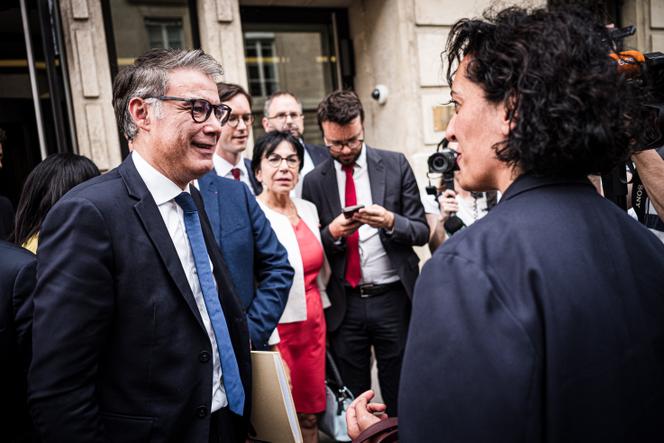


Speaking on television on the evening of Wednesday, July 10, Socialist leader Olivier Faure still had no answer to the question of who could be the potential prime minister to represent the left-wing Nouveau Front Populaire (NFP) alliance. "We are all eager to reach a result," he promised. Three days after the second round of France's snap parliamentary elections, which were narrowly won by the NFP, with 182 MPs, the pressure is mounting on the left-wing alliance. Meanwhile, figures on the right and some among President Emmanuel Macron's camp are working hard to keep the NFP out of government.
On Wednesday, Macron himself disputed the NFP's victory in a letter to the French people, stating "no one has won." He suggested that the NFP was not in a position to govern and invited "all the political forces" who recognize their commitment to "republican institutions," "parliamentarianism," and who have a "European orientation," to form "a majority." The president clearly wants a coalition without La France Insoumise (LFI, radical left), which he has repeatedly described as outside of the "republican arc".
This has caused an uproar on the left: "I've made the choice of the left rallying together and I won't budge from it," retorted Faure on France 2. The Socialist leader urged Macron to "respect his duty as a republican, respect universal suffrage and respect the vote of the French."
Furious, LFI leader Jean-Luc Mélenchon denounced "the return of the royal right of veto over universal suffrage" and "the intrigues of the Fourth Republic." The day before, ex-LFI MP Adrien Quatennens called for "a great people's march toward [the prime minister's office]," drawing a barrage of criticism from his opponents, who, like Interior Minister Gérald Darmanin, deemed his remarks to be "factious."
Since Sunday evening, France's left-wing parties – Socialists, LFI, Greens and Communists – have been holding a series of meetings, videoconferences and conclaves to agree on a potential prime minister, a government that has a place for each group and a way of operating. "The idea is to arrive at a global arrangement: The party that has the prime minister doesn't have the other sovereign ministries," explained David Cormand, a Greens MEP who has been at the heart of the discussions.
Moreover, he did not rule out the possibility of "expanding to include people who want to break with Macronism." "We want to move forward quickly, we need to thwart Macron's maneuvers, that will try to bypass the French people's vote," urged Christian Picquet, a member of the Communist party leadership who has also been involved in the talks. On the RMC radio station on Thursday morning, Greens MP Sandrine Rousseau regretted that a proposal was not already on the table. "I think we're taking far too long. We're losing ground, and we're also causing concern in a way by not being capable of putting together a team and a government. So yes, we have our share of responsibility" for the country's unstable situation, she warned.
You have 62.9% of this article left to read. The rest is for subscribers only.
